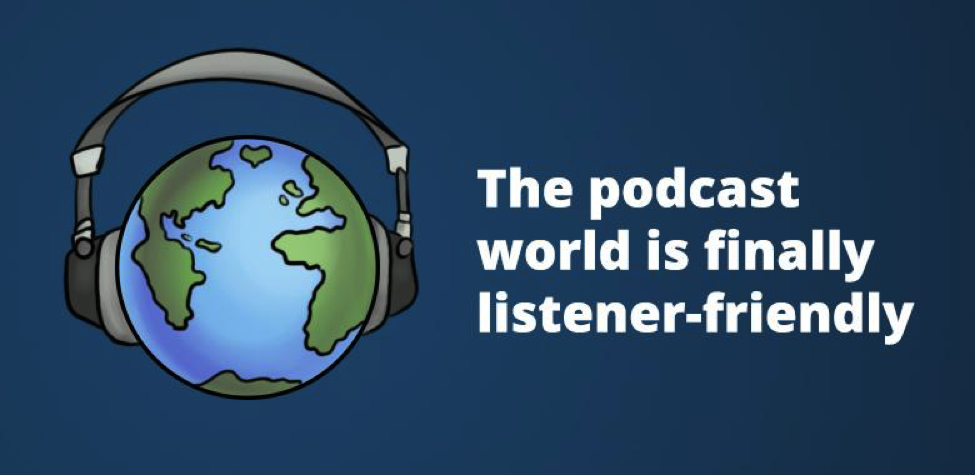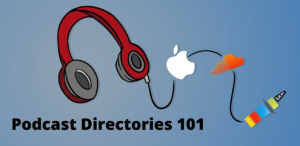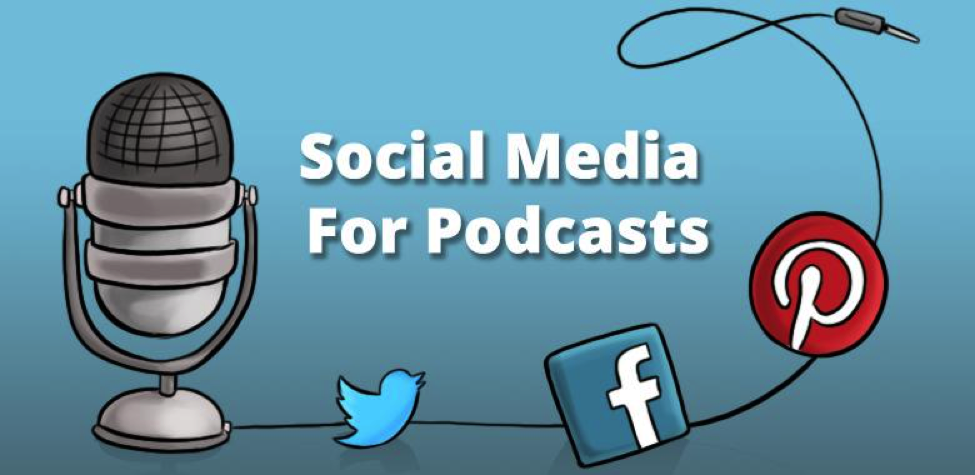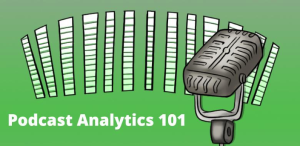Podcasting is the next big thing.
We know you’ve heard that mantra more times than you want to admit. You get the point. But do you know why?
Why You Should Create and Promote A Podcast
The podcasting business is booming. Three years ago, a few major media outlets, including the New York Times, dropped audio. They claimed a lack of audience interest; podcasting looked like a flash in the pan. Smaller outlets kept up their audio engagement, though, as did many former ham radio jockeys and bloggers. Their audience was small, devoted, and steadily grew… but apps were clunky, the listening options were limited, and most devices weren’t podcast friendly.

According to an article on Fast Company, interruptions can actually equal money for business, more advertising space, and yeah – less of an investment than video media. Podcast ads also convert surprisingly well. Best of all, The Washington Post reports that downloads passed the 1 billion mark in August 2014.
If you don’t promote your content, no matter how revved you are to make some cash and an impact on the air, you never will. You’ve got to promote your content to make it visible. Regardless of how many people are ready to listen to you and craving your content, no one will know it exists if it’s never promoted.
Luckily, I’ve got some tips to help you make your podcast a hit.
Using Podcasting Directories To Get More Listeners

Having a podcast is a step in the right direction, but you also need to be heard. Existing isn’t enough. How do you do that?
Getting featured in iTunes
Get featured in iTunes. This used to be much more effective, but it still can land you a lot of new listeners, is free, and has a lasting impact on your podcast. Nice little note for your podcasting resume: “Featured on iTunes” …yeah. You get my drift.
Check out these articles for tips on getting iTunes to love your podcast:
- How to Get Your Podcast to No.1 in iTunes! (Chris Ducker’s Personal Launch Strategy)
- How to Get Your Podcast into New and Noteworthy in iTunes
List your podcast in the top directories
Be someplace people can find you. List your podcast in the top directories. Make a list of top directories for your niche, too – some bloggers put together podcast roundups for specific areas. If you find one that matches your podcast, send them a link to your program and ask if they’d consider featuring you. Can’t hurt!
There are some directories that every podcaster should know.
Let’s go over some of our favorites here:
- iTunes – This is by far the largest platform for podcasts. iTunes got into the game back in the day when podcast was synonymous with iPod, and they’ve dominated the field since day one. The benefit? A huge potential audience.
- Stitcher– This amazing little app drives traffic to your podcast by letting would be listeners search for streaming audio that matches their interests. Writing a top-notch description is key for succeeding here.
- iHeart Radio – Streaming radio service that tops the list by combining the strategies used by iTunes and Stitcher. They’ve been around a while, and have a large audience with consistently high quality podcasts.
- Audioboom – Catering to the masses audioBoom lets you monetize your podcast – even through Facebook and Pinterest. This user friendly app is a popular pick for many listeners.
- SoundCloud – Growing steadily, SoundCloud is a platform that centers on music and audio performance arts. It isn’t right for everyone, but it is a great pick for musicians.
- TuneIn – With over 4 million audio programs and podcasts and 10,000 radio channels, TuneIn is an audio monster. Make sure you can be found here.
- MixCloud – Free for listeners, mobile-friendly, and radio centered, this is another platform you can’t afford to skip.
There are hundreds of unique opportunities and strategies to promote your podcast, so don’t limit yourself to what I’m mentioning here. Test everything, and if you come up with a new strategy, test it too! Check out this article on Basic Blog Tips for more info.
For a list of apps and other places you can have your podcast listed, checkout Podcast Places.
Podcast Growth Hacking

Now that you’ve got the basics down, let’s look deeper into podcast promotion. Our advice? Don’t spend a fortune on marketing. Go grassroots. Here’s how:
Tap into popular podcasters’ audiences
Sounds like a challenge, right? It’s not. Look for opportunities to co-host an episode with a known podcaster. Make sure you have something to offer their audience that doesn’t overlap directly with the podcaster area of expertise, but will appeal strongly to the same demographic. It saves them time and effort by having one less podcast to produce, gives you a new contact in the industry, and helps grow your audience.
Interact directly with the social media feeds of similar podcasts to yours that already have a large audience, too. Don’t directly advertise your podcast, but do participate actively and with high value comments and insights. Soon enough, you’ll have their audience members looking you up.
Be my guest
Include guests in your podcasts. People love new voices, new content, and a fresh feel. If you always offer great content and you invite the occasional (or even regular) guest, you’ll have your listeners begging for more. Besides, a conversation is usually more interesting than a soliloquy. And your guests are great promoters – they’ll share the link for your show with friends and family to help the podcast they starred in be heard.
Where can you find someone worth putting on the air? Check out your list of friends, family, colleagues, and ask them about who they know, too. Remember the idea of six-degrees of connection? Use it in your favor. Check out HARO, too. Post a query, and see what happens…
You can also use the following search queries on Google to find experts in your niche that are open to doing interviews:
- “niche” intitle:interview
- “niche” intitle:“q&a with”
- “niche” intitle: “tips from” OR “advice from” OR “chat with”
So, if your podcast is about web design, replace “niche” with “web design” in Google. The result will be people in your industry that are willing to do interviews. Next step is to reach out of them.
Be their guest
Looking for a way to make waves? Get your show heard?
Be a guest.
Yup. As important as having guests on your show can be, it’s equally important to be featured on other people’s podcasts. You can ask around to see who needs a guest or two, or you can use SpeakPipe and call in to other peoples’ podcasts, leave a voicemail comment or question, and start to build an on-air reputation for yourself.
This tip is one you’ll find on a lot of sites, and many of the best podcasters actively employ it. Speaking of which, I also recommend that you check out SpeakPipe for yourself. Add it to your podcast, and let your listeners call in with comments, questions, and the like, too. Fair is fair, right?
Do a roundup blog post
Yes, actually do a blog post. You’ll find that pro bloggers, content marketers, and other content pros will be more than happy to share your content if you mention them in it… positively, of course. Many might even give you a little snippet to post as a quote from them in the article itself. I know this tactic works because we’ve tried it.
Here are a few key tips from Brian Dean at Quick Sprout on how to create a killer roundup post:
- Give experts whose quotes you’ve read in other roundup posts a tap on the shoulder. They’ve already given quotes and lent their voices to other posts – making them more likely to say yes to being quoted than someone you’ve never seen contribute in a roundup.
- Use FollowerWonk to find experts in your field. A roundup is only worthwhile if the people you include are relevant to your audience. Make sure you pitch your targeted contributors like your life depends on it – you aren’t going to get them to participate if you can’t sell them on the value of it.
- Include their headshot in the post, and give them credit where it’s due.
Keep yourself organized, follow up with each contributor, and send them the link to share with their followers. It pays off.
Get More Search Traffic To Your Podcast

Make sure you follow the best practices I’ve mentioned. They serve one major purpose – making search engines love you. And everyone loves to be loved. Especially when that affection results in a bigger audience.
Draw Traffic with SEO
Want more listeners, a great reputation, and respect from search engines? Follow the best practices for images, tagging, and the like. Don’t skip the SEO, it does matter for podcasts. Make sure your podcast is search engine friendly by tagging the files and images appropriately. Here’s what you need to know:
- SEO generally applies to written content, but it’s likely to be applied to visual and audio content in the near future, too. The technology already exists.
- Google isn’t the only search engine that matters, and the same SEO techniques work for almost all of the ones podcasters need to know about. iTunes, Yahoo, Bing, YouTube, and of course, Google are the search engines you need to keep in mind for your podcast.
- Use great post titles that catch your audience’s attention. Think about what they are looking for and aim to be relevant. The title is the most important part of your written description. Focus on it.
- Name your image files something that matches the post – and pick images that work with your podcast content. For example, a post on the health benefits of cheddar cheese might have a photo of a wheel of cheddar. Don’t leave it named “ch1753_2013.jpg,” instead, change the name to “cheddar-cheese-is-deliciously-healthy.jpg”. Use alt tags in your HTML.
- Don’t stuff your writing with unnecessary keywords. It WILL backfire. High quality content is always a better option than keyword soup. Focus on what your listeners want, not just on search algorithms and bots.
- Use synonyms, long tail keyword phrases, and keywords that appeal to your listener’s goals when they search. Eliminate the word “podcast” from your keywords and see what happens – most people don’t start out looking for a podcast, but do want the information they’ll find in your audio broadcast.
- Make sure you include show notes or a transcript of your podcast in your post, and that the text includes a few keywords, naturally incorporated, that relate to your podcast’s contents.
Get Listeners To Share Your Show

Hello. Social media is about having a conversation, and you’re hosting a podcast. The two go hand-in-hand. Make sure that your social media communities are well-tended. Interact with your listeners directly, be open, and keep your brand image consistent across platforms. (Yes, YOU are a brand!)
Once in a while, post a link to your podcast. New community members, followers, or likers might give it a click out of curiosity.
Gaining followers on Facebook
Facebook is a community space. This is a great place to interact with your audience. You can automate posts using a service like Buffer or HootSuite, but make sure to personally interact with your listeners, too. Post original memes and visual content, videos, and even the occasional audio file to help draw new listeners, shares, and likes.
For the Twitterpated
140 characters or less can be a challenge, but a picture is worth one thousand words. Remember to post a variety of tweets, including visual posts. Hyperlink to your podcast in tweets, with hashtags that correspond to the content. Follow influencers in your area and interact with them, too. Be personable, retweet content that your listeners will love, and follow Twitter etiquette. Buffer and Hootsuite can both help you out here, too.
Pinterest for your Podcast
Pinterest’s user base is full of visually minded people and women make up the majority. If the content of your podcast can have a visual side to it or is popular with women then getting into Pinterest is a good move. By posting original images that are relevant to your podcast’s content, you can find new followers fairly quickly. Make sure you have at least five boards with five images before you make them public, and pin posts from relevant influencers.
How To Analyze Your Podcast’s Success

Podcast up? Check.
Promotion in progress? Check.
Is it working? Ummm…
You’ve put a ton of effort into creating, posting, and promoting your podcast. Follow through. You need to analyze your efforts. Keep track of these stats to know how your promotional efforts are performing:
-
Site Traffic — How many people are coming your website? Google Analytics is the place to turn for this data.
-
Feed Subscriptions — How many people think you are worth subscribing to? This data should be readily available from whatever feed services you use. Don’t trust it to give you too much insight into your podcast’s performance, though. The number of subscribers can be misleading. Use them to give you a ballpark figure and trends, nothing more.
-
Bounce Rate — Once you’ve got someone on your page, do they stick around? Once again, turn to Google Analytics. They’ve got some solid data on bounce rate that will give you an idea how many people check you out and how many run for the hills when they see your page.
-
Media Downloads — What do your site visitors do on your page? Do they download your podcast? Like bounce rate, this stat tells you more than just how well your promotional efforts are doing. You’ll also learn how well your web page performs if you track this kind of conversion on your own site.
Most directories will give you a total number of media downloads, too. Hone your written description of your podcast to improve the download rates from directories, and look for webpage copy problems and design problems to fix low website downloads.
- BONUS — Use Mention or Social Mention to see who is talking about you, and when. Social Mention will even let you know if what they say is positive or negative!
Ready to Start Promoting Your Podcast?
The best time to start anything is yesterday. The next best time is today. If you already have a podcast, put these tips to use and see how they impact your following and analytics.
 Darren DeMatas
Darren DeMatasDarren has an MBA in Internet Marketing, but hangs his hat on a decade of experience in the trenches. Check out ecommerceCEO to learn more about ecommerce.




